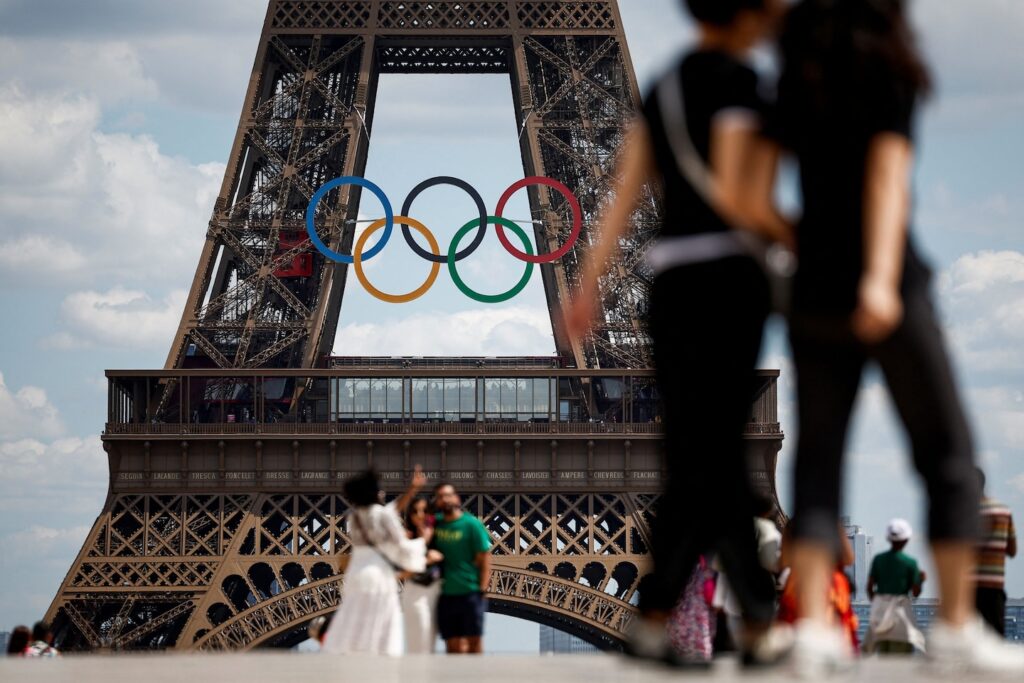My daughter was born in Paris on the day the Eiffel Tower caught fire.
It was a muggy late July 21 years ago, and smoke was rising from the tower's top observation deck. When a historic heatwave spread and peaked a few weeks later, it wasn't just Paris' most iconic building that suffered. About 15,000 people died in France that summer, many of them elderly Parisians.
There isn't much air conditioning in Paris, at least by American standards: Few Parisian apartments have central air conditioning, and in many apartments, box air conditioners won't fit in windows that open like doors.
Despite rising summer temperatures in recent years (five years ago it reached 108 degrees), many Parisians remain calm, considering air conditioning a climate-destroying luxury enjoyed mainly by whiny Americans (I learned that lesson the hard way).
So don't think that organizers of this summer's Paris Olympics were being cold-hearted or cutting costs when they built non-air-conditioned accommodation for the roughly 15,000 athletes and officials due to arrive next month, and the 9,000 Paralympians due to arrive in August. It was entirely deliberate, and they are now facing backlash for it.
U.S. sports officials have determined that indoor temperatures in the Olympic Village are inadequate for athletes and will be bringing in their own air conditioners for the hundreds of U.S. athletes and officials heading to the Games, as will other countries such as Australia that are familiar with summer heat.
They concluded that the Olympic Village's environmentally friendly cooling system, which relies on wind circulation and water pumped from deep underground, is inadequate for this purpose, and they believe world-class athletes need more comfortable living quarters.
The Olympic Village's designers claim that their “natural” air conditioning system will ensure that temperatures in most apartments will never exceed 80 degrees Fahrenheit most of the time. Their project is intended to last longer than just the Olympics: After the athletes return home, the 125-acre site will become a zero-carbon district of apartments, offices, and shops.
The short-term problem, the problem for the Olympians, is that the apartments they live in are designed to be more or less comfortable for “normal” summer weather. As we all know, there is no such thing as “normal” anymore when it comes to weather. Last year, France experienced its hottest late summer on record.
This discrepancy has been on the minds of organizers for some time, and they are undeterred.
“We have great respect for the comfort of the athletes, but above all we are thinking about the survival of humanity,” Anne Hidalgo, Paris' Socialist mayor, said last year in her criticism of the plans.
Mayor Hidalgo took office in 2014. Her laudable initiative is to make the city carbon neutral by 2050, an incredibly ambitious program that includes hundreds of miles of new bike lanes and a massive expansion of pedestrian areas and green spaces, creating a nightmare for people who want or need to drive around the city. (Ask any Parisian taxi driver about the mayor and prepare for a lengthy story that will last the entire trip.)
Hidalgo, who boasts that the Paris Olympics will be the greenest Olympics ever, is also one of the driving forces behind the Games' other bold (or should I say crazy) environmental gamble: holding some of the aquatic events on the Seine.
For a century, the murky waters of Paris' rivers have been too toxic for the city's swimmers, but the $1.5 billion Olympic cleanup, which includes an underground cylindrical drum capable of holding the equivalent of 20 Olympic swimming pools' worth of polluted rainwater, was meant to make the river safe.
Undaunted by frustrated skeptics, the mayor announced a few months ago that he was going to take the plunge: he would show the world what marvels of French engineering have achieved. Perhaps foolishly, he set the date for last Sunday.
So far, not so good. New drainage ponds and other new infrastructure can't keep up with fecal bacteria levels that are higher than expected due to a wet, gray spring. The mayor prudently postponed the swim just days before it was scheduled, a triumph of self-preservation over civic pride.
The unair-conditioned Olympic Village and the cesspool-like Seine are cautionary tales: In both cases, authorities have sought ways to overcome the damage humanity has done to the planet, from carbon that is heating the atmosphere to pollutants that are fouling the rivers.
Both adventures are bold ventures. Both are subject to the planet's changing climate. A hotter-than-usual summer could mean scorching heat for those who don't bring air conditioning. Heavy rains could turn the Seine into a cesspit.
The Paris Olympics may see a weather break between now and the opening ceremony on July 26. In the meantime, salute the boldness of Olympic organizers, and for all you American TV viewers, turn your thermostats up a few degrees. We'll make it.



